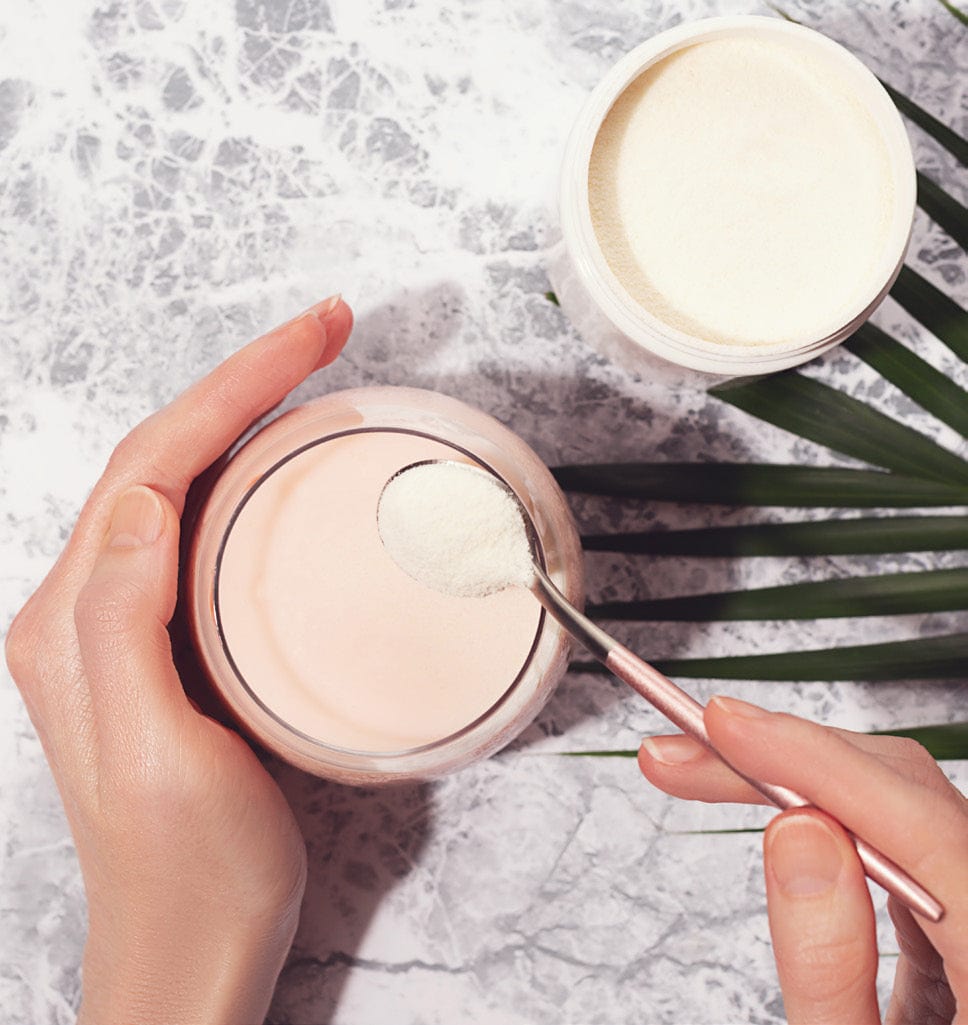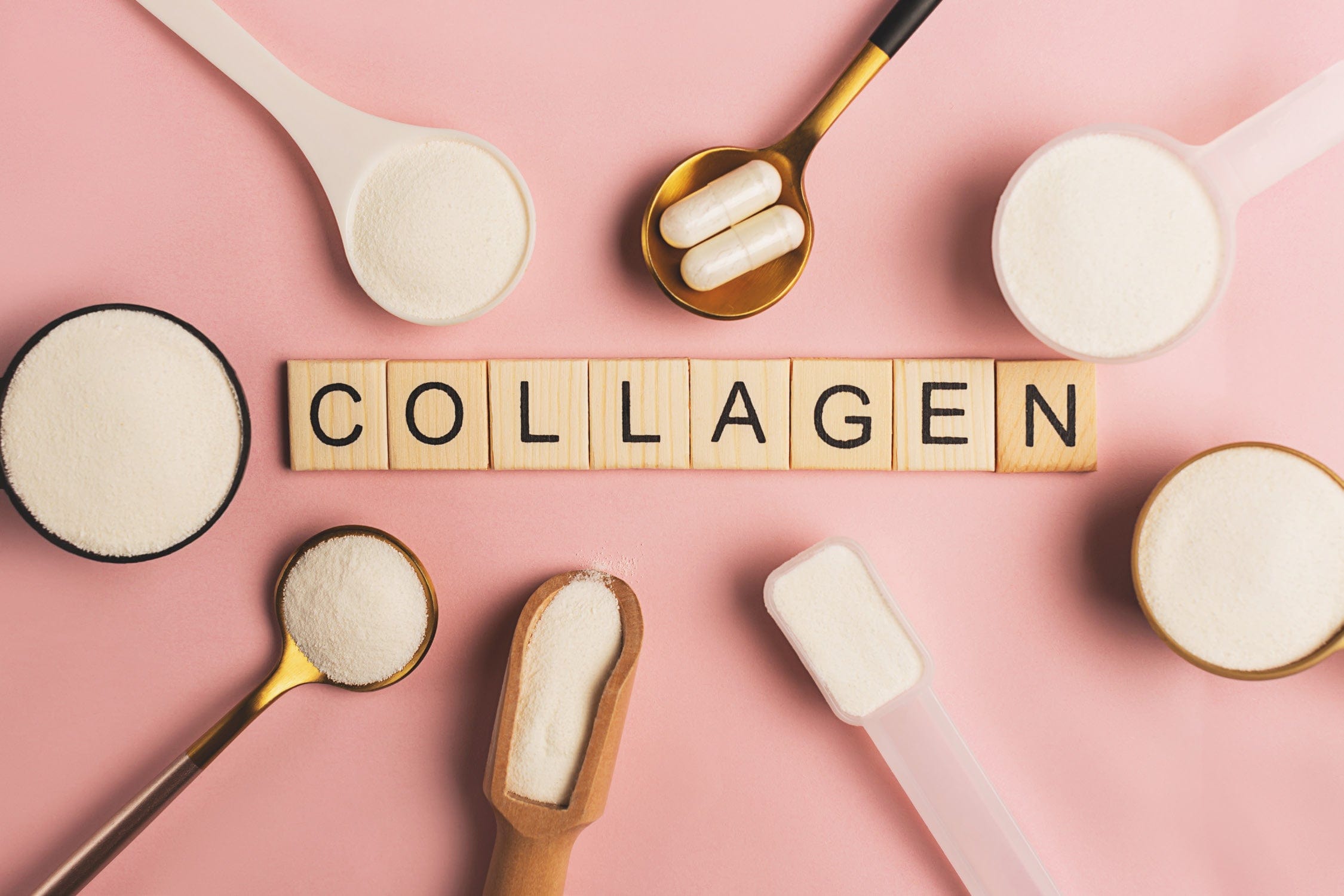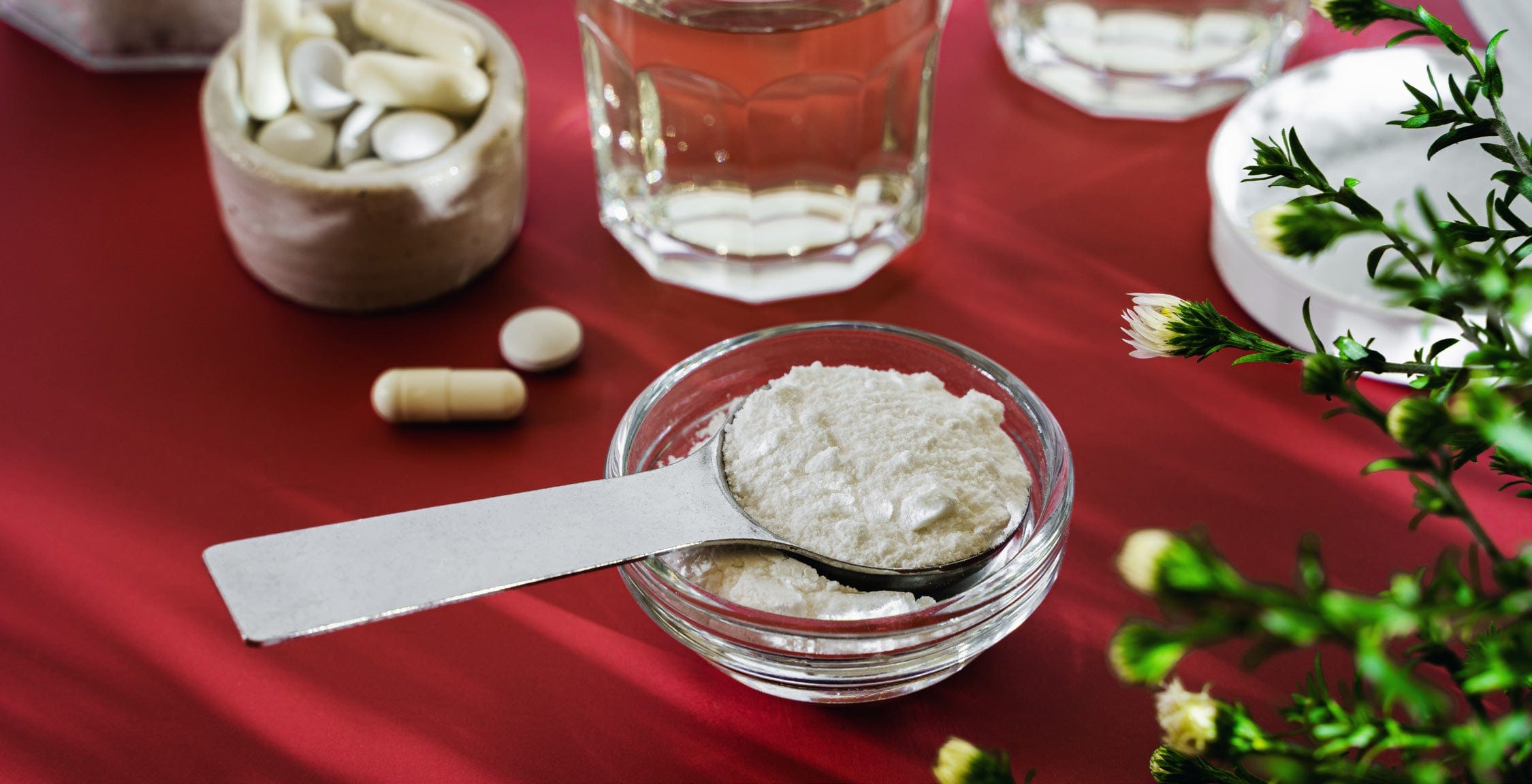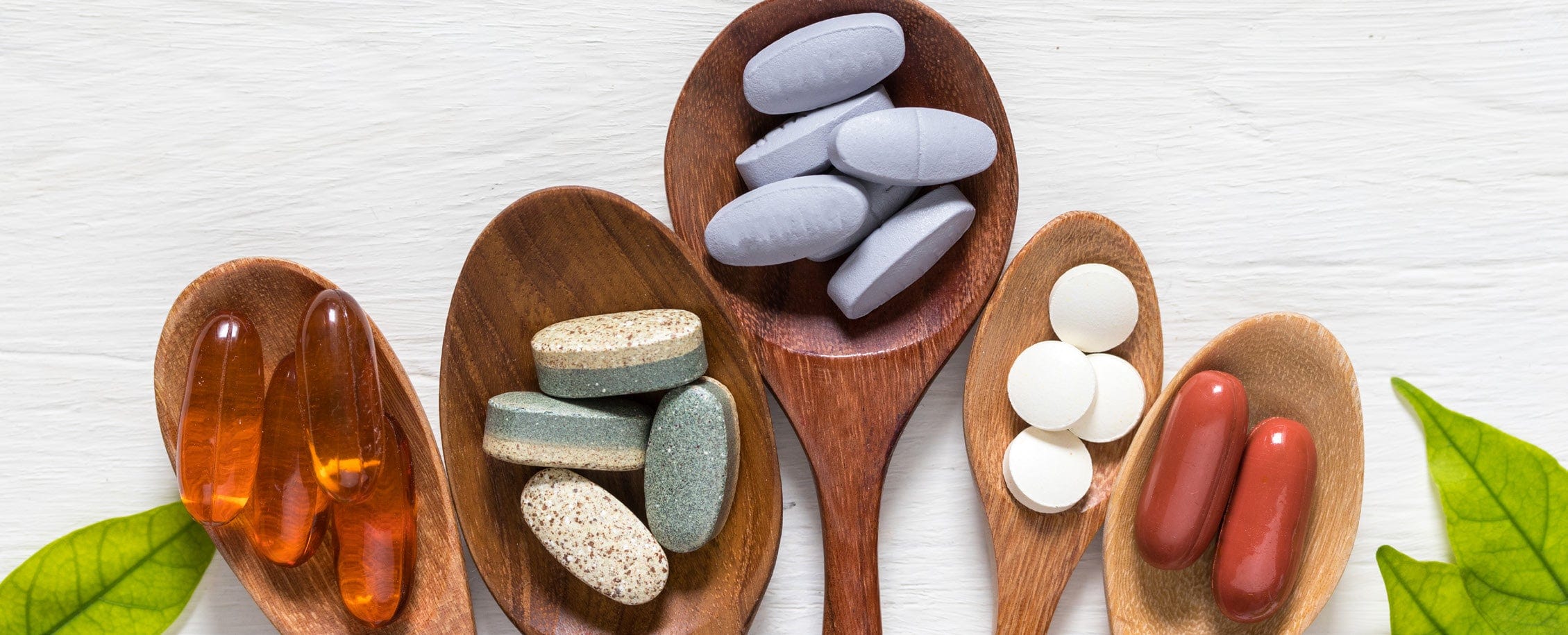Panduan Terbaik untuk Bubuk Protein Kolagen

Contents

Collagen is a special protein in your body that functions almost like cement or glue — it helps your cell walls, connective tissue, muscle, and skin hold their shape, yet also remain elastic and flexible[1].
And studies show that the use of collagen protein powder supplements, a powdered form of collagen protein that’s designed for easy digestion, have a wide range of promising health and fitness benefits[2][3].
In this guide, you’ll learn everything you need to know about collagen protein powder, including:

What Is Collagen Protein Powder?
Collagen protein powder is a dietary supplement made by processing regular collagen protein using a method called enzymatic hydrolysis.
This process breaks whole proteins down into smaller groups of amino acids called peptides, making them easier to digest[4].
It’s also called hydrolysed collagen protein, collagen hydrolysate, or collagen peptides.
How Collagen Protein Powder Works
To understand how collagen protein powder works, it’s helpful to first understand the function of collagen in your body.
In mammals (including humans), collagen is the most abundant protein, accounting for around one-third of the total protein found in your body[5].
Collagen is found in many different tissues, especially in the extracellular matrix of cells, in skin, and in other connective tissues (such as tendons, ligaments, and cartilage in joints and other areas)[6].
This protein has important differences from other proteins. It’s very high in the amino acids glycine, proline, and hydroxyproline, and its unique three-dimensional structure allows it to be tough yet elastic at the same time — perfect for providing support and literally holding your body together[1].
As you age, your body’s collagen production goes down, and the natural breakdown of collagen results in the loss of collagen over time[7].This age-related reduction in collagen is associated with some signs of aging, including skin wrinkles as well as joint problems like osteoarthritis[4][8].
Recent research suggest that obtaining more collagen in your diet, especially in the form of hydrolysed collagen protein, may help support collagen synthesis and production, even in older people[9]
Although it’s not essential to consume collagen in your diet — your body can produce collagen protein from the amino acids found in other dietary proteins — evidence suggests that taking collagen protein supplements may result in your body incorporating the collagen dipeptides and tripeptides (short chains of amino acids with two or three aminos each) directly into tissues in your skin, joints, and elsewhere[10]
To sum up, aging or injuries to your skin, joints, or other areas of your body may result in the loss of collagen, but taking collagen supplements appears to support collagen production, which can be beneficial for skin health, joint health, and more.
The Different Types of Collagen Protein Powders
There are many different kinds of collagen.
For example, in your body, there are at least16 different types of collagen, although 80-90% of it consists of Types I, II, and III found in the skin, tendon, bone, ligaments, cartilage, muscle, and blood vessels[11].
The main differences between different collagen types are in their three-dimensional shapes and where they occur in the body[11].
Because the processing of hydrolysed collagen breaks longer collagen fibrils down into shorter peptide chains, the different collagen types are unlikely to play a major role in the effects of collagen protein powder — and regardless, most collagen protein supplements available primarily contain one or a mix of the most abundant types (Types I, II, and III).
Early evidence suggests that bovine collagen hydrolysates differing in molecular weight distribution, average molecular weight, and aggregation behavior may have different effects in human cartilage, but there’s not enough research in this area yet to apply findings to the processing of collagen supplements[12]. It’s possible that different collagen processing methods could yield a variety of benefits in future studies, but it’s too early to say based on available data.
Collagen supplements are also made from different animal sources. Most studies use collagen protein powder made from beef, although a few use collagen from pork, chickens, or marine sources[13][14][15].
There aren’t any high-quality studies that directly compare the effects of collagen from different animal sources, so for the most part it’s difficult to say currently whether or not using a specific source is necessary for achieving a given benefit.
If you want to achieve a specific benefit found in a study, it’s smart to take the same kind of collagen if possible. But if you can’t obtain the exact same collagen type or source used in research, it’s fine to use another kind for similar results — the differences are unlikely to be very significant.
Who Should Take Collagen Protein?
Anyone can take collagen protein powder, but it’s a good idea to have a specific reason in mind before you use any supplement. Scientific studies show benefits for young athletes, older people with arthritis or who want smoother skin, and nearly everyone in between[16][17][18].
If you’re looking to support general health, you can also consider including collagen-rich foods like gelatin or bone brothin your diet instead of using collagen protein powder.
The Differences Between Hydrolysed Collagen vs. Gelatin vs. Bone Broth
Collagen protein powder, gelatin, and bone broth all contain collagen, but they’re not fully interchangeable with one another.
Gelatin is made from animal collagen, but compared to hydrolysed collagen, it’s less processed and less broken down. People mainly use gelatin in recipes while cooking, but you can also take it like you would use a collagen supplement.
However, because the collagen protein chains are more intact, it may take longer to digest and may not absorb as well[4]. And because gelatin forms a gel in water, it may also be more difficult to drink than hydrolysed collagen protein[19].
In the future, it’s possible that studies might demonstrate distinct benefits to using gelatin compared to hydrolysed collagen, but there’s not enough evidence to say one way or the other yet.
Bone broth or stock made from beef, chicken, or fish bones is a traditional food that’s relatively high in collage[20].
The downsides of homemade bone broth are that compared to collagen protein powder, it’s more expensive, less convenient, and actually may not contain very much collagen protein depending on how you make it[21].
Some people believe there could be unique bone health benefits to consuming bone broth versus other sources of collagen. It’s possible, but uncertain, as no studies of this nature have been conducted yet.
However, there’s no denying that bone broth is a delicious, traditional way to get collagen protein along with a healthy dose of vitamins and minerals.
Note: Our homemade bone broth recipe is tried and true, or for anyone who’s pressed for time, the dehydrated bone broth products we offer meet the highest standards for flavor, texture, and quality.
Unlike whey protein and most other protein supplements and dietary sources of protein, collagen protein is not a complete protein because it lacks the essential amino acid tryptophan[22].
While there are notable benefits to using it as a supplement, collagen protein is not suitable as a source for obtaining the majority of your daily protein.
Some evidence suggests you could consume up to one-third of your daily protein intake from collagen safely, but most studies use doses between 5-20 grams, so there’s really no good reason to take more than that[22].
And compared to whey protein and other complete proteins, it’s also much lower in the branched-chain amino acids (BCAAs) and essential amino acids (EAAs) your body requires to repair muscle tissue[23]. As a result, whey and similar protein sources are a better choice for building muscle and supporting recovery from weight training or other physical activity[24].
In short, collagen protein has distinct effects compared to other proteins, but it’s not a replacement for them. For best results, include plenty of protein from other sources in your diet, too.

All the Benefits of Collagen Protein According to Scientific Studies
- Skin Health and Cosmetic Benefits
- Brain Health and Cognitive Function
- Strong, Healthy Joints
- Performance and Recovery
- Healthy Bones
- Gut Health
- Strong Nails
- Sleep Quality
- Appetite Control
Collagen Supports Skin Health and Offers Cosmetic Benefits
Collagen protein is an extremely important structural component in your skin[11]. Studies suggest that consuming collagen protein supplements can support healthy skin as well as provide other cosmetic benefits.
A 2019 systematic review of oral collagen supplementation published in the Journal of Drugs in Dermatology found that:
- Oral collagen supplements support skin elasticity, hydration, and dermal collagen density.
- Preliminary results are promising for the short and long-term use of oral collagen supplements for wound healing and skin aging.
- Further studies are needed to elucidate medical use of collagen for dermatological purposes.
A more recent study published in 2021 in the Journal of Cosmetic Dermatology examined the effects of freshwater marine collagen on skin wrinkles, elasticity, and self-reported appearance in women aged 45- 60[25]. The study found that:
- Participants who received hydrolysed marine collagen had a 24% greater reduction in wrinkles than the placebo group
- At week 12 (the final week), participants who received collagen reported greater improvements in overall skin score as well as wrinkles, elasticity, hydration, radiance, and firmness.
Other evidence suggests that taking collagen may also support smooth skin texture and help protect skin from wear and tear[17][26].
NourishMe Organics 100% Pure Marine Collagen is a natural, bioactive source of Type 1 collagen peptides — the same ones found in human bones and skin. Our Marine Collagen is a high-purity, highly bioavailable product, containing over 90% protein by weight.
Collagen Supports Strong, Healthy Joints
Evidence suggests that collagen protein supplements can help support healthy joints and connective tissues in athletes, older people, and individuals with osteoarthritis[3][16][27].
A 24-week randomised controlled trial of 147 collagen varsity or club sport athletes found statistically significant improvements when subjects took 10 grams of collagen hydrolysate daily versus placebo[16].
Changes included[16]:
- Joint pain at rest, assessed by a physician
- Joint pain when walking (self-assessed)
- Joint pain when standing (self-assessed)
- Joint pain at rest (self-assessed)
- Joint pain when carrying objects (self-assessed)
- Joint pain when lifting (self-assessed)
A subgroup analysis of 63 participants with knee joint pain found even more pronounced differences with collagen supplementation compared to placebo[16].
A separate 2019 study of recreationally active men found that taking 15 grams of collagen per day for 12 weeks day may support stronger connective tissue compared to placebo[3].
However, athletes aren’t the only people who might consider taking collagen protein powder to support joint health.
According to a 6-month study published in 2012 that included 200 patients over age 50 with lumbar spine pain, taking a mere 1200 milligrams (1.2 grams) of collagen hydrolysate per day resulted in clinically significant improvements in joint health for over half of participants[28].
A 2019 meta-analysis on the effects of collagen supplementation in people with osteoarthritis found that collagen was significantly beneficial in supporting joint health[27].
Collagen Supports Healthy Bones
Collagen supplements may support healthy bones in people of all ages by supporting healthy bone modeling and healthy bone metabolism[29][30].
In a 2018 randomised, placebo-controlled double-blinded investigation published in the journal Nutrients, researchers measured the effects of 12 months of daily oral administration of specific collagen peptides (a type of bovine collagen supplement) compared to placebo in 131 postmenopausal women[31].
Using an intention to treat analysis (which also includes anyone who dropped out of the study when calculating the final results), the scientists discovered that collagen protein significantly supported bone mineral density of the spine, femoral neck, and other markers of bone health[31].
NourishMe Organics 100% Pure Hydrolysed Beef Collagen is a high-purity, natural bioactive product derived from grass-fed beef. Consisting of Type 1 & Type 3 collagen, with 18 different amino acids, this supplement offers functional properties not found with other protein sources.
Collagen May Support Strong Nails
Fingernails are made of the structural protein keratin, not collagen, but collagen may support healthier, stronger fingernails according to one study
In a 2017 trial published in the Journal of Cosmetic Dermatology, investigators gave 25 participants 2.5 grams of specific collagen peptides each day for 24 weeks, followed by a 4-week break[32].
Although the study is small and preliminary, the results were promising: collagen supported a 12% increased nail growth rate, 42% decrease in broken nails, and 64% improvement in brittle nails[32]. An 80% majority of participants agreed that the collagen treatment improved their nail appearance and were satisfied with the treatment.

Collagen May Support Appetite Control
Any form of dietary protein can be helpful for healthy appetite control and preventing cravings, but some preliminary evidence suggests that collagen protein may have additional appetite control benefits[33].
One small 2008 study found that when given gelatin protein, both lean and obese subjects had higher levels of glucagon-like peptide 1 (GLP-1), an important hormone that targets appetite control[34]. The researchers concluded that “these findings may be applied to maximise satiety in obese patients as a means of improving adherence to calorie-controlled diets as well as provide better control of [sic] diabetic patients.”
Collagen May Support Brain Health and Cognitive Function
In a study published in the journal Nutrients in 2020, scientists investigated the effects of hydrolysed collagen protein on language cognitive function and brain structure in 30 healthy participants, aged 49-63 years, for a 4-week period. They found collagen protein supported healthy brain structure as well as measures of cognitive function[35].
Currently, the mechanisms by which collagen might support brain health benefits are unknown. The researchers responsible for the 2020 paper speculate it may support healthy levels of brain-derived neurotrophic factor (BDNF) or healthy glucose and insulin regulation, but there won’t be a conclusive answer without further studies[35].
Collagen May Support Recovery from Post-Workout Soreness
Collagen protein supplements might help speed recovery of performance and reduce soreness following intense workouts.
A randomised controlled trial published in the journal Amino Acids in 2019 found that compared to placebo control, active men who took 20 grams per day of collagen protein recovered faster following a high-repetition drop jump exercise and had less soreness two days later[36].
Another trial, published in 2020 in the International Journal of Sports Nutrition and Exercise Metabolism found similar results using 15 grams of collagen protein[37].
Due to the fact that collagen isn’t a complete protein, it’s probably not a good choice for a standalone protein shake after every workout.
Some research shows that whey protein or other complete proteins are likely more effective for building muscle[38]. But you can still take collagen alongside other proteins, or mix them together into a single shake, to support faster recovery or reduce soreness.
Collagen May Support Gut Health
Extremely preliminary in vitro evidence (conducted outside living organisms) suggests that collagen protein supplements may help support gut health by supporting the integrity of the gut’s endothelial barrier and tight junctions[39][40].
Current evidence indicates that dysfunction of the endothelial barrier and tight junctions appear to be involved in the development of leaky gut syndrome[41].

Collagen May Support Sleep Quality
Collagen protein is naturally high in glycine, an amino acid shown in clinical studies to support sleep quality[42][43]:
By weight, collagen contains about 25% glycine[44]. To obtain the appropriate amount of glycine used in studies to support sleep quality (3 grams), you would need to consume approximately 10-12 grams of collagen protein before bed.

How to Use Collagen for Health, Wellness and Other Benefits
You can take collagen any time of day or night, with or without food.
There’s no strong evidence suggesting timing or whether you consume it with a meal makes a big difference in the results, so you should do whatever’s most convenient.
Taking collagen on an empty stomach allows your body to digest it faster, which could be helpful if you’re using it before bed for sleep.
Likewise, if you want to take it 30-45 minutes before meals to lower your appetite, you may notice better results if you take it on an empty stomach.
Clinical studies of collagen use doses ranging from as little as 1 gram per day up to 20 grams per day. For the most part, cosmetic studies examining the effects on skin and fingernails use lower doses, while studies looking at joint health, bone health, recovery, and repair use higher doses.
For most people, 10 grams per day is an appropriate starting dose to determine how well collagen works for you. It’s right in the middle of the usual dosage range in trials, making it an average dose.
If you’re working with a tight budget and would prefer to spend a bit less money on collagen, you can try a dose of 5 grams each day, gauge your results, and increase if needed.

Other Supplements and Practices Proven to Support Collagen Synthesis
Taking collagen protein supplements is one promising method to support collagen synthesis, but not the only way
If you’re determined to boost collagen synthesis, here are some other research-backed ideas to consider:

What to Look for in Collagen Protein Powder
Collagen supplements can help support your health, but they’re not beneficial for your body if they contain unsafe levels of contaminants.
In 2020, a white paper published by US non-profit Clean Label Project and the Organic Consumers Association found that of 30 collagen peptide brands tested, 13% contained unsafe levels of heavy metals[49].
Another, even more prevalent issue is the presence of artificial flavors, sweeteners, preservatives, fillers, and other unnecessary ingredients.
When you’re shopping for collagen protein powder, look for supplements that contain only one or two ingredients without any artificial ingredients or fillers that are ethically sourced and tested to be free of contaminants like heavy metals.
Grass-fed, organic, or wild-caught are also excellent qualities to look for in collagen supplements.
What Is the Best Collagen Protein?
The best collagen protein powder depends on your individual needs.
Here are our top picks for the very best collagen protein supplements that don’t contain artificial additives, unnecessary fillers, or contaminants.
NourishMe Organics 100% Pure Hydrolysed Beef Collagen
NourishMe Organics 100% Pure Marine Collagen
Pete Evans Dehydrated Bone Broth with Tasmanian Pepperberry & Turmeric and Pete Evans Dehydrated Bone Broth with Wattleseed Lemon Myrtle & Kakadu Plum
Is Collagen Protein Safe to Take?
As long as your collagen protein supplements are free of contaminants, collagen is generally safe and welltolerated[25]. A 2019 review in the Journal of Drugs & Dermatology found collagen is “Generally safe with no reported adverse events”[2]. Collagen allergy is rare[50].
However, it’s wise to limit your daily collagen intake to about 20 grams per day or less, as used in most studies.
Because collagen isn’t a complete protein — it lacks the amino acid tryptophan — consuming large quantities of collagen each day could result in a tryptophan deficiency[22].
Some researchers have calculated that consuming up to 36% of your daily protein intake from collagen supplements would be safe, but there’s no reason to take that much[22].
Side Effects of Collagen Protein
Adverse effects from taking collagen supplements are essentially unreported in peer-reviewed literature.
If you’re taking the recommended dose, your collagen supplements are free of contaminants, and you don’t have an allergy to collagen protein (which is rare), you’re very unlikely to experience any problems taking collagen.
Occasionally, people experience stomach discomfort or digestive issues when switching to a new protein powder. If your stomach feels upset after taking collagen, try mixing it with more water, taking it with food, or temporarily lowering your dose.
Conclusion
Collagen protein is a safe, effective way to support skin health and cosmetic benefits, joint health, bone health, strong fingernails, and more.
Early research also suggests collagen may support appetite control, brain health and cognitive function, postworkout recovery, gut health, and sleep quality
The best way to use collagen supplements is to take a daily dose of 10-20 grams.
As long as you don’t have a rare collagen allergy, there’s essentially zero risk of any adverse effects from taking collagen at recommended dosages.
Look for 100% pure, certified contaminant-free, organic collagen supplements without any artificial ingredients or fillers.
At NourishMe Organics, we sell the highest quality collagen protein powders and a complete line of traditional foods and dietary supplements for all your health and wellness needs.
Feel free to contact us any time if you have questions or need assistance finding the perfect functional food or supplement.














